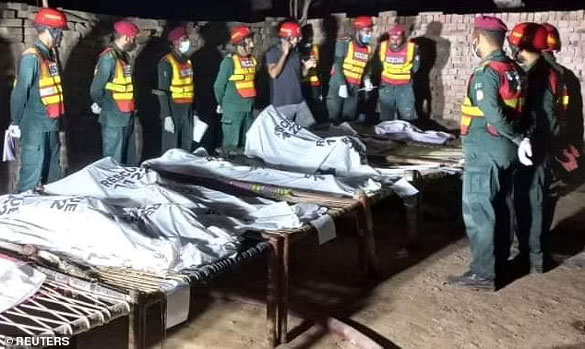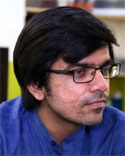New Age Islam Edit Bureau
29 July 2016
The Hijab Does Not Impede Muslim Women From Doing Their Job
By Yara Al-Wazir
In Lebanon, All Are Responsible For The Presidential Vacuum
By Nayla Tueni
Fact-Checking Saudi and Iranian Statements On Terrorism
By Dr. Majid Rafizadeh
The US, the Peshmerga and Mosul
By Michael Knights
All Life Same In Fight Against Terror
By Bikram Vohra
Compiled By New Age Islam Edit Bureau
-----
The Hijab Does Not Impede Muslim Women from Doing Their Job
By Yara al-Wazir
28 July 2016
Earlier this week, Kevin MacKenzie, former editor of The Sun questioned whether it was appropriate for a Muslim anchor that wears the hijab “to be on camera when there had been yet another shocking slaughter by a Muslim”. The woman he was referring to is Fatima Manji, an award-winning journalist who covered the attacks for the UK’s Channel 4.
Although the Independent Press Standards Organization (Ipso) received over 1,700 complaints about MacKenzie’s column in The Sun, including one by Fatima Manji herself, the thoughts and sentiments he shared in the column, including that the Hijab was a “sign of slavery” could not be farther from the truth. Conceding to MacKenzie’s desire of all women to conform to his idea of what a female news presenter should look like, including deconstructing her belief system, which form a basis of her personality and the way that she presents herself, would in fact be a form of slavery.
Manji’s hijab is not what made MacKenzie, and those who share his thoughts, uncomfortable. The image of a strong powerful female Muslim who is successful, true to herself and her religion is what made them uneasy. Had Malala Yousafzai been presenting the news, would he have chosen to publish his column? Unlikely.
The Hijab Discussion at EU Courts
After a woman who wears the Hijab claimed unlawful dismissal due to religious discrimination in Brussels, the issue was taken to the EU court. In May, a top EU court advisor backed a workplace ban on Hijabs, as long as it is in line with an outright ban on religious symbols for all employees.
The public must understand that there is no single definition of the relationship that someone can share with his or her religion, and so it cannot be “checked at the door”. Some see it as something they were born into and born with, much like their gender, whereas others see it as something private.
If a court can even suggest that it should have the authority to stop its employees from visual representations of their religion, then what is next? Will women have to wear sports bras to hide the fact that they are women? Will people be asked to not wear their wedding rings to work to hide their relationship status? Will men have to speak with a softer voice to hide the fact that they are men?
The mere suggestion that whether or not a woman covers her head has the power to stop her from doing her job is ludicrous, unless perhaps she’s a hair model. Attempting to stop people from visual representations of their religion can be seen as a violation of their personal freedom and an attack on free speech. The hijab may be a piece of cloth that doesn’t make a sound, but the symbol roars so much so that even in this day and age, when the rate of hate crimes against Muslims in London has doubled over the past two years, women are standing up as icons of strength and allegiance.
My hope for Muslim women everywhere is that one day the Western world will treat them with as much respect of their ideas, ethics, and intelligence as it does with Malala.
Yara al Wazir is a humanitarian activist. She is the founder of The Green Initiative ME and a developing partner of Sharek Stories.
Source: english.alarabiya.net/en/views/news/middle-east/2016/07/28/The-hijab-does-not-impede-Muslim-women-from-doing-their-job.html
---
In Lebanon, All Are Responsible For The Presidential Vacuum
By Nayla Tueni
29 July 2016
Lebanese Christian leader Amin Gemayel has said that Samir Geagea’s endorsement of Michel Aoun for the presidency will only increase his stubbornness, since Aoun’s obstruction of presidential elections is based on Christian help he has never dreamed of.
Geagea has provided Christian cover out of good intentions, but has prolonged the presidential vacuum and given Aoun an excuse to cling to his policy of “me or nobody else.”
Aoun is not convinced that his chances of becoming president have decreased, and that if he does become president it will be at the expense of the state, its institutions and people. He is not yet convinced that he will be unable to reform what he contributed to destroying and corrupting by obstructing the election of a president for more than two years now, and to restore soured relations between Lebanon and the world, particularly the Arab world.
MP Suleiman Franjieh is also nominated for the post, and he does not make concessions unless according to a set of conditions. He insists on remaining a candidate, thus obstructing a settlement on an alternative candidate.
Hezbollah
Meanwhile, Hezbollah insists on making March 14 parties accept its candidate Aoun. Hezbollah asks the Future Movement why it rejects him for the presidency, but it does not question its self-granted right to impose its will on others.
Hezbollah has never referred to the democracy that obliges the party to attend parliament sessions to elect a president - any president who can garner the majority of votes - especially since the competition is now limited to two candidates who are both its allies. This means it does not want to facilitate the election of a president because it benefits the most from an incapable government and paralyzed parliament.
The Future Movement hangs on to the possibility of nominating Franjieh for the presidency to sideline Aoun. This resembles Druze leader Walid Jumblatt’s plan to nominate MP Henri Helou. It is within this context that the Future Movement and Jumblatt do not spare a chance to hold democratic elections in parliament.
Their relatively weak argument contributes - even if in a small way - to delaying an agreement. However, both parties are always present in parliament, and both are convinced that they will not be able to get their candidates to the presidential palace.
Other parties do not have an answer to any of this, and have not taken any stance. They just act according to whatever is planned for them, until the time comes when a foreign agreement imposes a settlement on us. They thus confirm to the Lebanese people that despite their loud rhetoric and threats, those in governance await signals from foreign parties and put their interests above the country’s.
Nayla Tueni is one of the few elected female politicians in Lebanon and of the two youngest. She became a member of parliament in 2009 and following the assassination of her father, Gebran, she is currently a member of the board and Deputy General Manager of Lebanon’s leading daily, Annahar. Prior to her political career, Nayla had trained, written in and managed various sections of Annahar, where she currently has a regular column.
Source: english.alarabiya.net/en/views/2016/07/29/In-Lebanon-all-are-responsible-for-presidential-vacuum.html
---
Fact-Checking Saudi And Iranian Statements On Terrorism
By Dr. Majid Rafizadeh
29 July 2016
According to Iran’s state-owned news outlet Press TV, Iranian Foreign Ministry Spokesman Bahram Qassemi has warned Saudi Foreign Minister Adel al-Jubeir to think twice about "the repercussions of his statements.”
Al Arabiya News Channel aired Jubeir’s recent statement that was in response to earlier remarks given by Iran’s General Consul, accusing Saudi Arabia in a way that I believe was unsubstantiated, regarding an event on terrorism held by the Belgian Ministry of Foreign Affairs in Brussels on July 21, 2016.
It is worthwhile to fact-check the statements.
Harboring, supporting and sheltering terrorism
Since the Iranian revolution in 1979, Iran’s military, financial, and sanctuary support for terrorist groups, as well as Iran’s direct or indirect involvement in terrorist attacks across the globe in Europe, Africa, the Middle East and America have been well-documented by many credible intelligence reports across the world, as well as various news outlets.
On a diplomatic level, several members of the international community have also accused Iran of being responsible for terrorism from India to the US, by sponsoring, training, funding, arming or giving sanctuary to terrorist groups and individuals.
Iran’s support, which is confirmed by Iranian leaders, or the leaders of the allied groups, is not limited to Shiite-designated terrorist groups such as Hezbollah or Asa'ib Ahl al-Haq.
The current narrative is that Iran wants to defeat ISIS and al-Qaeda leaders and that Tehran and Washington have mutual interests. However, Iran’s relationship with al-Qaeda and ISIS has a long history and their ties are more complicated than the mainstream narrative.
Iran is believed to have maintained its ties with al-Qaeda since the early 1990s. According to multiple intelligence reports and external experts, Iran’s Revolutionary Guard Corps (IRGC) gave shelter, protection, assistance, Iranian passports to many senior a;-Qaeda members, including the founder of al-Qaeda in Iraq (Abu Musab Al Zarqawi), the predecessor to ISIS, when the US was looking for him.
Most recently, three senior al-Qaeda members, who have been added to the US government’s list of designated terrorists, are believed to have been “located in Iran” at some point. Al-Qaeda senior members have been capable of escaping US drones by living in Iran, using Iranian passports and being used as a pawn to advance Iran’s foreign policy objectives. Hiding some of these figures has been instrumental in giving birth to ISIS. According to a report by the Claremont Institute, which cites German intelligence, being a Shiite government has not stopped Iran from partnering up with al-Qaeda, which brands itself as Sunni. According to the US Treasury, Iran has even helped al-Qaeda fighters enter Syria.
In addition, an audio message from Bin Laden’s son Hamza, which was released in recent weeks, points to the “continuation of Iranian sponsorship” within al-Qaeda, according to a report by a US-based think-tank. Declassification of 113 hand-written messages also revealed, according to the report, that Bin Laden said Iran is “the chief pathway for our money, men, communiqué, and hostages” and he urged his group “not to start a front against Iran.”
The US State Department has released its latest annual report related to terrorism and global terrorist activities, in which it stated: “Iran remained the foremost state sponsor of terrorism in 2015, providing a range of support, including financial, training, and equipment, to groups around the world – particularly Hezbollah. Iran continued to be deeply involved in the conflict in Syria, working closely with the Assad regime to counter the Syrian opposition, and also in Iraq where Iran continued to provide support to militia groups, including the Foreign Terrorist Organization Kata’ib Hezbollah. In addition, it was implicated for its support to violent Shia opposition group attacks in Bahrain. Iran was joined in these efforts by Hezbollah, which continued to operate globally, as demonstrated by the disruption of Hezbollah activities in Peru in 2014 and Cyprus in 2015.”
Three crucial pillars that Iran relies on are the IRGC, the intelligence wing of the IRGC and Iran’s proxies.
In addition, judicial and intelligence evidence has pointed to Iran’s connection with al-Qaeda in the 9/11 terrorist attacks. Earlier this year, US District Judge George Daniels in New York ordered the Islamic Republic to pay more than $10.5 billion in damages to the estates and families of people who died at the World Trade Center and the Pentagon.
The court held that “Iran furnished material and direct support for the 9/11 terrorists specific terrorist travel operation” and the “facilitation of al-Qaeda's operatives' travel to training in camps in Afghanistan was essential for the success of the 9/11 operation.” It also stated that a “terrorist agent of Iran and Hezbollah helped coordinate travel [for the hijackers].”
Expansionism and exportation of Iran's revolution
In his statement last week, Jubeir asked: “Doesn't the Iranian constitution say "export the revolution"? Didn't Iran create Hezbollah? Didn't Iran attack more than a dozen embassies in Iran in violation of all international laws?”
A central part in Khomeini and Khamenei’s ideology is exporting their revolution, which is emphasized in Iran’s constitution. Article 11 states that the constitution “provides the necessary basis for ensuring the continuation of the Revolution at home and abroad” and “will strive with other Islamic and popular movements to prepare the way for the formation of a single world community.”
According to article 144, Iran’s constitution delegates to its military the fulfillment of these goals: “The Army of the Islamic Republic of Iran must be an Islamic Army, i.e., committed to Islamic ideology and the people ... It will be responsible not only for guarding and preserving the frontiers of the country, but also for fulfilling the ideological mission of jihad in God's way; that is, extending the sovereignty of God's law throughout the world.”
With regards to Iran supporting groups, which are designated as terrorist by the international community, not only is the evidence overwhelming, but Iranian authorities or leaders of these groups have also publicly admitted their involvement, such as the leaders of Hezbollah have done.
In closing, Iran’s funding, arming, supporting, training and giving sanctuary to terrorist groups is well-documented.
Although at the end of his speech, Jubeir extended his hands and hoped that Iran will change its behavior, as long as Iran pursues its deep-rooted ideological and revolutionary beliefs of achieving regional hegemony and preeminence - through exporting its revolution, relying on hard power, and supporting terrorist groups - Tehran will not be a constructive and rational state actor for either the region, or for its own citizens.
Dr. Majid Rafizadeh is an Iranian-American scholar, author and U.S. foreign policy specialist. Rafizadeh is the president of the International American Council. He serves on the board of Harvard International Review at Harvard University and Harvard International Relations Council. He is a member of the Gulf 2000 Project at Columbia University, School of International and Public Affairs. Previously he served as ambassador to the National Iranian-American Council based in Washington DC.
Source: english.alarabiya.net/en/views/2016/07/29/Fact-checking-Saudi-and-Iranian-statements-on-terrorism.html
----
The US, the Peshmerga and Mosul
By Michael Knights
29 July, 2016
On July 12, the United States signed a memorandum of understanding with the Kurdistan Regional Government (KRG) regarding US-Kurdish military cooperation in the next stage of the war against the self-styled Islamic State of Iraq and the Levant (ISIL, also known as ISIS).
On the Kurdish side, the agreement was signed by acting Minister of Peshmerga Affairs Karim Sinjari, and the US side was represented by Elissa Slotkin, the acting assistant secretary of defence for international security affairs.
After the agreement the Kurdish leadership met on July 14 with US Central Command commander General Joseph Votel, followed by a visit to Erbil by US Secretary of Defense Ash Carter on July 24.
Battle on the horizon
The meetings are a further indication that the battle of Mosul is fast approaching, and that the Iraqi Kurds are expected to play a critical role in the encirclement, liberation and subsequent stabilisation of the city.
On the symbolic front, the US leaders have recently expressed gratitude for the sacrifices of the Peshmerga, who have suffered 1,466 killed, 8,610 wounded and 62 missing in their war against ISIL, according to a June 14 press release by the KRG.
This was important because Kurdish leaders have often complained that the US has shown a preference for arming and equipping the federal government's Iraqi army rather than the Peshmerga.
On the symbolic front, the US leaders have recently expressed gratitude for the sacrifices of the Peshmerga, who have suffered 1,466 killed, 8,610 wounded and 62 missing in their war against ISIL, according to a June 14 press release by the KRG.
According to officials that I talked to on both sides of the deal, the agreement will also release new US aid to the Ministry of Peshmerga Affairs.
Though the KRG asked for $197m per month to cover incremental war costs, the Pentagon rationalised this figure down to around $60m.
This is not an open-ended arrangement: It will only cover the operating expenses of the Peshmerga forces involved in the Mosul operation for the duration of their involvement, totalling around $415m.
Military equipment also continues to flow into Kurdistan, including planeloads of German, US, French, British and Hungarian munitions, weapons and non-lethal supplies.
But these imports are not "direct arming" of the Peshmerga of the kind called for by US legislators, but blocked by the Obama administration in June 2015.
Though aid is now being flown direct into the KRG, the manifests of aircraft are approved by the Iraqi Ministry of Defence.
Intensive training
If anything is changing, it is the scale and effectiveness of the anti-ISIL coalition effort to train and equip the Peshmerga.
Since January 2015 the coalition has run the Kurdistan Training Coordination Centre (KTCC), a 300-person training mission manned by German, Italian, British, Finnish, Dutch, Norwegian, Hungarian and American troops.
From January 2015 to April 2016 the KTCC trained nine sets of Peshmerga troops at five KRG bases, graduating roughly 500 troops each time. Though useful, this training was only four weeks long and mainly focused on squad and platoon-level tactics involving fewer than 40 soldiers.
The new Modern Brigade Course (MBC) training offered since April 2016 is a big step forward.
The training is 10 weeks long, allowing units to build greater skills and cohesion, and giving time for advanced training in battlefield life-saving, anti-tank operations and defence against chemical weapons.
The MBC training also allows larger company-sized units - of around 100 soldiers - to practise coordinated operations in realistic urban warfare environments resembling Mosul.
The two 600-men MBC courses that were completed so far have also seen the fielding of US brigade equipment sets, as opposed to the mishmash of equipment used by previous sets of trainees.
Kurdistan is now receiving the equipment allocated under the KRG's $353.8m share of the $1.6bn Iraq Train and Equip Fund (ITEF) approved by the US Congress in November 2014 (PDF).
Each MBC course sees the Peshmerga receive 36 mortars and around 160 tactical and engineering vehicles. Training is also being provided to maintain the new equipment.
What's after?
Yet, while these steps are positive for the Kurds, it is harder to know whether the train-and-equip effort will be sustained after Mosul.
In one scenario the coalition packs up and goes home, leaving the Peshmerga once again isolated from international military assistance.
This might be the preference of Baghdad and of regional players such as Iran.
Indeed, Peshmerga spokesman Jabar Yawar was quick to refute the idea of permanent US military bases in the KRG when he spoke to Rudaw on July 20, possibly mindful of sensitivities in Tehran and Baghdad.
In another scenario - for instance triggered by the election of a Kurd-friendly Donald Trump - the US security cooperation effort in Kurdistan could become even larger and more permanent.
For the Kurds, the only near-term option is to maximise the goodwill of international players by treading a fine line, supporting the Mosul battle while simultaneously reassuring regional actors in Tehran and Baghdad.
Michael Knights is the Lafer Fellow at the Washington Institute for Near East Policy. He specialises in the politics and security of Iraq. He has worked in every Iraqi province and most of the country's hundred districts, including periods embedded with Iraq's security forces.
Source: aljazeera.com/indepth/opinion/2016/07/160727120458839.html
----
All Life Same In Fight Against Terror
By Bikram Vohra
29 July 2016
In his latest book Daniel Silva talks of Daesh's long-term plan to try and get the United States to commit troops to Syria. Albeit a writing of fiction, the plot deals with a scenario where Daesh would like to create a major issue before Obama's term ends because this is the indecisive period of an American administration. And it stigmatizes the tenure.
Not just that but Daesh is losing territory and without territory you are on the back foot. In its relative despair it may try to up the stakes.
It says something for the polarization of the price on life that the blasts in Baghdad do not get the same global attention and are sort of taken as par for the course. Unless the global media begins to focus the same level of attention and bring things on an even keel where death and destruction are concerned there is always going to be less consequence for every such attack in the Middle East, be it Baghdad or Damascus. Think for a moment how much attention was paid to the 330 civilians who died in the twin blasts earlier this month and how it played in the world's media?
While comparisons are odious and there is no intent to do that the imbalance reflects a dangerous mindset in that shock and horror are proportionate to where the atrocity takes place.
This attitude is an intrinsic weakness in the fight against terror. A whole swathe where it is, ironically, most intense is downplayed.
While the western world might find it valid to up its alert levels there is a certain mind-game being played. It is a fitting reply given by Saudi Foreign Minister Adel Al-Jubeir to those threadbare accusations of Saudi funding for terrorists and this disinformation tactic does not even need an answer now. After the release of the 9/11 documentation and the fact, as the minister puts it, that Saudi Arabia is at "forefront of fighting extremism and terrorism in the region, and in the world" leaves that accusation out in the cold.
Few leaders have been so powerful in their condemnation than Al-Jubeir when he says, ""Why would we support an ideology whose objective it is to kill us? We are the target of extremists.
"[Daesh] wants access to Mecca and Medina, and so we have suffered in terms of terrorist attacks, we have suffered in terms of loss of security personnel trying to defend the innocent, we are on the forefront of fighting extremism and terrorism in the region, and in the world."
For relevance, perspective and logic it is difficult to beat. Not only is Saudi Arabia seeking out the men who pick up guns but also following the money trail. It is an easy statement to make even if it is careless and is not predicated to any evidence because there will be takers for it.
And it is these takers, falling back on false perceptions, who are doing the biggest disservice to the fight against terror.
Source: arabnews.com/node/961226/columns












